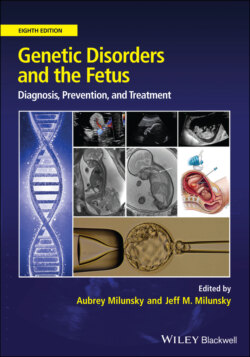Читать книгу Genetic Disorders and the Fetus - Группа авторов - Страница 13
1 Genetic Counseling: Preconception, Prenatal, and Perinatal
ОглавлениеAubrey Milunsky1,2 and Jeff M. Milunsky1,2
1Center for Human Genetics, Cambridge, MA, USA
2Tufts University School of Medicine, Boston, MA, USA
The time is fast approaching when virtually all the culprit genes and their mutations for >7,000 rare monogenic disorders1 will be known. Thus far, causal single genes and their mutations have been determined for 5,673 genetic disorders,2 enabling preimplantation genetic testing or prenatal genetic diagnosis. These advances using chromosomal microarrays, whole‐exome sequencing and even whole‐genome sequencing together with fetal imaging and noninvasive prenatal testing, expand the era in which all couples have the option of avoiding or preventing having children with irreversible, irremediable, crippling, or lethal monogenic disorders. Primary care physicians, and those in all medical specialties, will need to inform their patients of this key option. This imperative is already partly in current practice. Missing is the requirement of physicians to request and obtain the precise name of the genetic disorder in question or an existing DNA report on a family member, for prospective parents to benefit from available options.
Increasingly, couples are seeking prenatal diagnosis for adult‐onset genetic disorders in which mutations have been determined. Huntington disease prenatal diagnosis has been in the vanguard for many years, but now there are requests for adult‐onset dominantly transmissible disorders including breast and other malignancies, frontotemporal dementia, neurodegenerative disorders, and cardiomyopathies. The remarkable advances in genetics provide a cogent need to confer and refer. Physicians should not invite legal purview for a failure to inform, offer, refer, or provide genetic testing.
In context, couples at risk for having progeny with abnormalities expect to be informed about their risks and options, optimally during preconception counseling. Their concerns are serious, given the significant contribution of genetic disorders to morbidity and mortality in children and adults.
